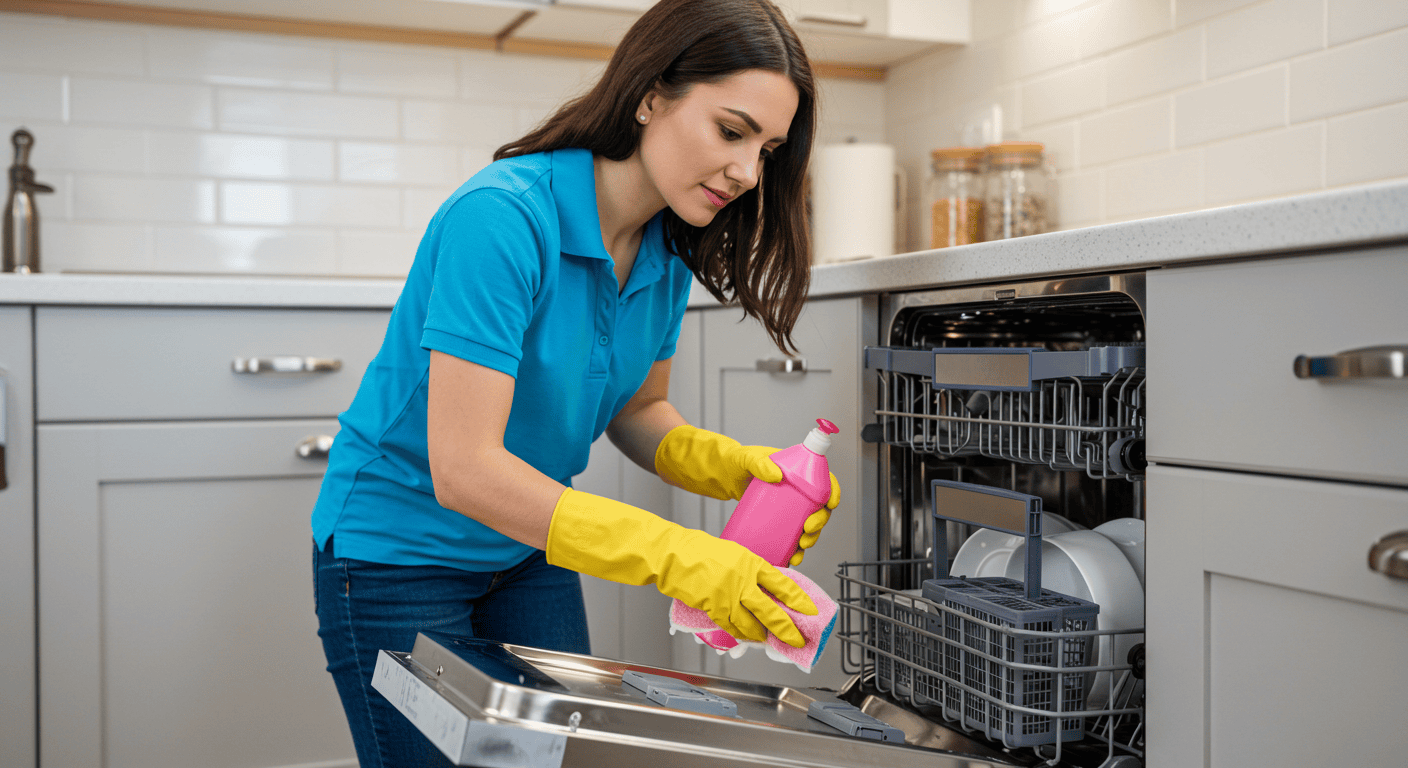How to clean your dishwasher might seem like a simple task, but doing it the right way can make all the difference between a fresh-smelling appliance and one that’s clogged with grime and odors. Over time, food particles, soap scum, and mineral buildup can accumulate inside, causing your dishwasher to work less efficiently and leaving your dishes less clean. In this guide, we’ll show you effective dishwasher cleaning techniques using natural ingredients like vinegar and baking soda, as well as maintenance tips to keep your machine running smoothly. Say goodbye to stubborn smells and hello to a sparkling, well-maintained dishwasher!
Why Cleaning Your Dishwasher Matters More Than You Think
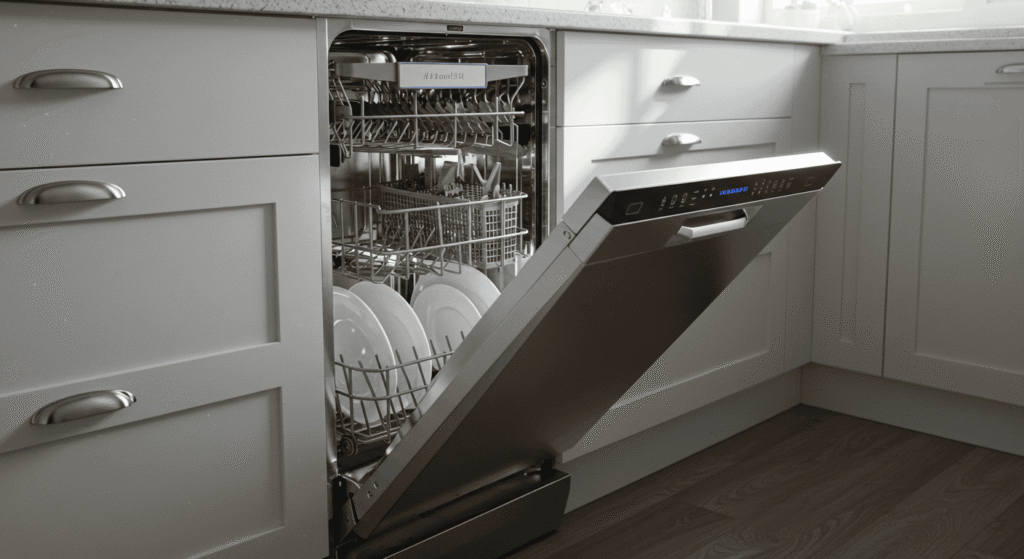
Keeping your dishwasher clean is often overlooked, yet it plays a crucial role in maintaining the efficiency and hygiene of this essential kitchen appliance. Understanding why cleaning your dishwasher is important will help you appreciate the impact it has on your daily life. Over time, leftover food particles, grease, and soap scum accumulate, creating an environment where mold and bacteria thrive. This buildup not only causes unpleasant odors but can also reduce the dishwasher’s cleaning power, leaving your dishes less than spotless. Regular maintenance prevents these issues, ensuring your dishwasher works at peak performance and keeps your kitchen healthy.
The Hidden Culprits: Food Particles, Mold & Buildup
The most common offenders inside a neglected dishwasher are tiny food particles trapped in filters and crevices. These bits of food provide a breeding ground for mold and mildew, especially in damp areas like the rubber gaskets and door seals. Soap scum and mineral deposits from hard water add to the buildup, clogging spray arms and reducing water flow. This combination of grime and moisture creates unpleasant odors and can even cause corrosion over time, shortening the lifespan of your dishwasher.
Effects of a Dirty Dishwasher on Your Dishes and Health
A dirty dishwasher doesn’t just affect the appliance; it directly impacts the cleanliness of your dishes and the health of your household. When buildup blocks spray arms or filters, dishes may come out with residue or spots. Worse, mold and bacteria can transfer onto plates, glasses, and utensils, potentially leading to health issues. Regular cleaning eliminates these risks, ensuring that every load is hygienically clean and safe to use.
Common Signs Your Dishwasher Needs a Deep Clean
Knowing when your dishwasher requires attention is key to avoiding bigger problems. Common signs include persistent bad odors, dishes that remain dirty or spotted after a cycle, slow draining, and visible buildup around the door or inside the tub. If you notice any of these warning signs, it’s time to perform a thorough cleaning to restore your dishwasher’s performance and freshness.
Why Cleaning Your Dishwasher Matters More Than You Think
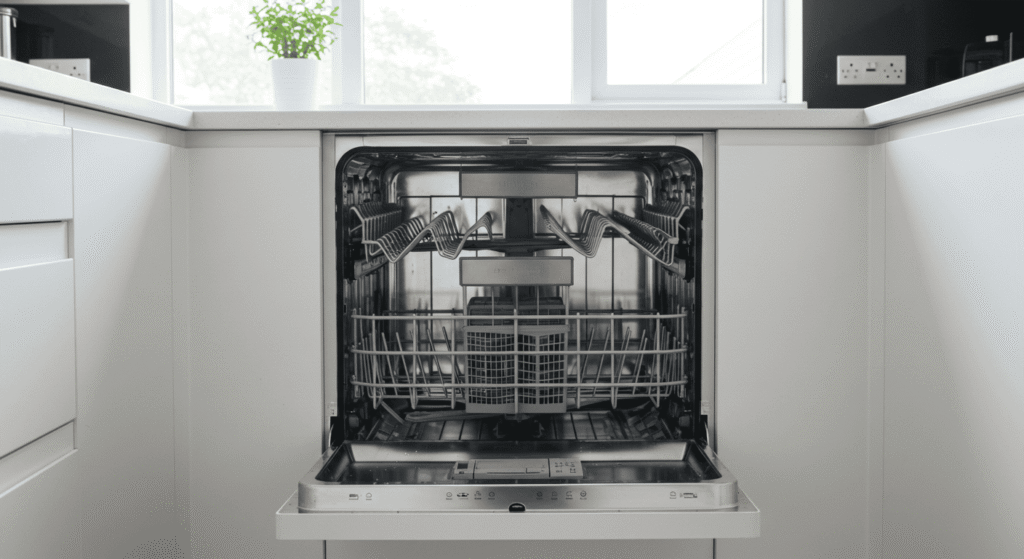
Keeping your dishwasher clean is often overlooked, yet it plays a crucial role in maintaining the efficiency and hygiene of this essential kitchen appliance. Understanding why cleaning your dishwasher is important will help you appreciate the impact it has on your daily life. Over time, leftover food particles, grease, and soap scum accumulate, creating an environment where mold and bacteria thrive. This buildup not only causes unpleasant odors but can also reduce the dishwasher’s cleaning power, leaving your dishes less than spotless. Regular maintenance prevents these issues, ensuring your dishwasher works at peak performance and keeps your kitchen healthy.
The Hidden Culprits: Food Particles, Mold & Buildup
The most common offenders inside a neglected dishwasher are tiny food particles trapped in filters and crevices. These bits of food provide a breeding ground for mold and mildew, especially in damp areas like the rubber gaskets and door seals. Soap scum and mineral deposits from hard water add to the buildup, clogging spray arms and reducing water flow. This combination of grime and moisture creates unpleasant odors and can even cause corrosion over time, shortening the lifespan of your dishwasher.
Effects of a Dirty Dishwasher on Your Dishes and Health
A dirty dishwasher doesn’t just affect the appliance; it directly impacts the cleanliness of your dishes and the health of your household. When buildup blocks spray arms or filters, dishes may come out with residue or spots. Worse, mold and bacteria can transfer onto plates, glasses, and utensils, potentially leading to health issues. Regular cleaning eliminates these risks, ensuring that every load is hygienically clean and safe to use.
Common Signs Your Dishwasher Needs a Deep Clean
Knowing when your dishwasher requires attention is key to avoiding bigger problems. Common signs include persistent bad odors, dishes that remain dirty or spotted after a cycle, slow draining, and visible buildup around the door or inside the tub. If you notice any of these warning signs, it’s time to perform a thorough cleaning to restore your dishwasher’s performance and freshness.
Effects of a Clean vs. Dirty Dishwasher
| Aspect | Clean Dishwasher | Dirty Dishwasher |
|---|---|---|
| Odor | Fresh, neutral smell | Unpleasant, sour or musty odors |
| Cleaning Performance | Dishes come out spotless and hygienic | Residue, spots, and partially cleaned dishes |
| Hygiene | Low risk of bacteria and mold growth | High risk of bacteria and mold contamination |
| Water Flow | Spray arms and filters work efficiently | Clogged spray arms and filters reduce water flow |
| Appliance Lifespan | Longer lifespan with regular maintenance | Potential corrosion and mechanical issues due to buildup |
This table helps visualize the clear benefits of keeping your dishwasher clean compared to the problems that can arise from neglect.
Tools & Ingredients You’ll Need for a Sparkling Dishwasher

Before diving into the cleaning process, it’s important to gather the right tools and ingredients. Using natural and easily available products can make your dishwasher cleaning both effective and eco-friendly. Alongside these, a few simple tools will help you reach every nook and cranny, ensuring a thorough clean without damaging any parts.
Natural Cleaning Ingredients: Vinegar, Baking Soda & More
Two of the most powerful and natural cleaning agents you can use are white vinegar and baking soda. Vinegar acts as a natural disinfectant and helps dissolve mineral deposits and soap scum. Baking soda is excellent for scrubbing and deodorizing, breaking down grime without harsh chemicals. Other household ingredients like lemon juice or hydrogen peroxide can also be useful for tackling stains and odors, but vinegar and baking soda remain the staples for safe and effective cleaning.
Handy Tools: Brushes, Toothpicks, and Cleaning Cloths
Having the right tools makes the cleaning process easier and more efficient. A soft-bristle brush or an old toothbrush helps scrub tight spaces like the dishwasher filter, spray arms, and door seals. Toothpicks or cotton swabs are perfect for removing stubborn debris from small holes or crevices. Microfiber cloths or sponges can be used for wiping down the interior surfaces. These simple tools let you reach spots that the dishwasher’s spray arms cannot, ensuring no buildup is left behind.
Safety Tips: What to Avoid When Cleaning Your Dishwasher
While cleaning, it’s important to avoid certain chemicals and practices that can harm your dishwasher. Never use bleach or abrasive cleaners, as they can damage the rubber seals and metal components. Avoid using harsh scrubbing pads that might scratch the interior. Also, make sure to turn off and unplug your dishwasher before cleaning any removable parts to prevent accidents. Following these safety tips protects both you and your appliance during the cleaning process.
Tools & Ingredients You’ll Need for a Sparkling Dishwasher
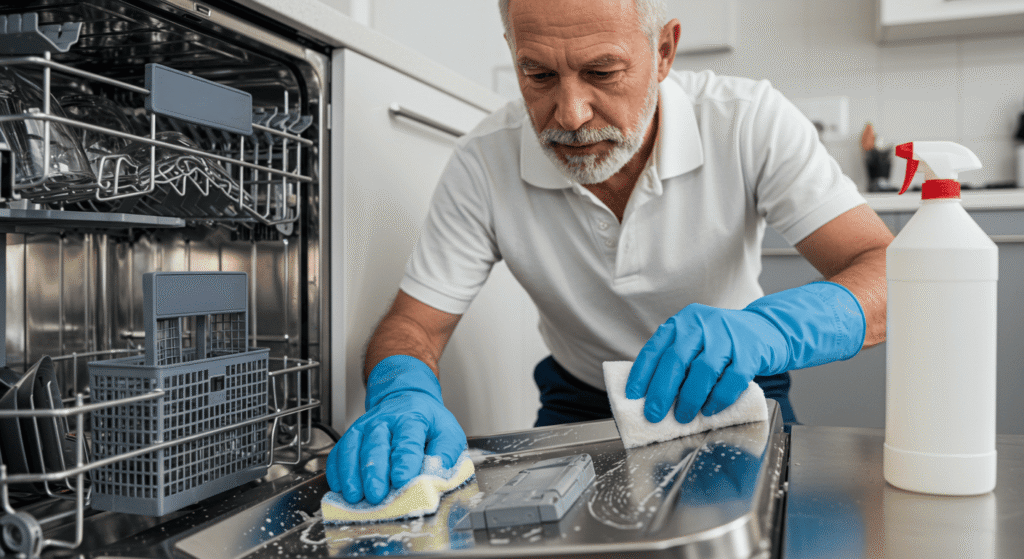
Before diving into the cleaning process, it’s important to gather the right tools and ingredients. Using natural and easily available products can make your dishwasher cleaning both effective and eco-friendly. Alongside these, a few simple tools will help you reach every nook and cranny, ensuring a thorough clean without damaging any parts.
Natural Cleaning Ingredients: Vinegar, Baking Soda & More
Two of the most powerful and natural cleaning agents you can use are white vinegar and baking soda. Vinegar acts as a natural disinfectant and helps dissolve mineral deposits and soap scum. Baking soda is excellent for scrubbing and deodorizing, breaking down grime without harsh chemicals. Other household ingredients like lemon juice or hydrogen peroxide can also be useful for tackling stains and odors, but vinegar and baking soda remain the staples for safe and effective cleaning.
Handy Tools: Brushes, Toothpicks, and Cleaning Cloths
Having the right tools makes the cleaning process easier and more efficient. A soft-bristle brush or an old toothbrush helps scrub tight spaces like the dishwasher filter, spray arms, and door seals. Toothpicks or cotton swabs are perfect for removing stubborn debris from small holes or crevices. Microfiber cloths or sponges can be used for wiping down the interior surfaces. These simple tools let you reach spots that the dishwasher’s spray arms cannot, ensuring no buildup is left behind.
Safety Tips: What to Avoid When Cleaning Your Dishwasher
While cleaning, it’s important to avoid certain chemicals and practices that can harm your dishwasher. Never use bleach or abrasive cleaners, as they can damage the rubber seals and metal components. Avoid using harsh scrubbing pads that might scratch the interior. Also, make sure to turn off and unplug your dishwasher before cleaning any removable parts to prevent accidents. Following these safety tips protects both you and your appliance during the cleaning process.
Tools & Ingredients Checklist
| Tools | Purpose | Notes |
|---|---|---|
| White Vinegar | Natural disinfectant and deodorizer | Use in cleaning cycle or spray |
| Baking Soda | Scrubbing and odor neutralizer | Sprinkle on surfaces before cleaning |
| Soft-bristle Brush | Scrubbing filters and seals | Gentle on dishwasher parts |
| Toothpicks or Cotton Swabs | Removing debris from crevices | Great for spray arm holes |
| Microfiber Cloths | Wiping interior surfaces | Avoid abrasive materials |
This checklist helps you quickly prepare all necessary tools and ingredients for a successful dishwasher cleaning session.
Step-by-Step Guide to Cleaning Your Dishwasher Inside Out
Cleaning your dishwasher thoroughly requires attention to key components that often harbor grime and buildup. Focusing on the dishwasher filter, spray arms, and rubber gaskets will help restore your appliance’s efficiency and keep odors at bay. Follow these steps carefully to ensure a deep clean without damaging any parts.
How to Clean the Dishwasher Filter: Why It’s Essential
The dishwasher filter traps food particles and debris during each wash cycle. Over time, this filter can become clogged, reducing water flow and allowing unpleasant odors to develop. Cleaning the filter regularly is essential to maintain proper drainage and ensure your dishwasher cleans effectively.
Removing and Cleaning the Filter Without Damage
First, locate the filter at the bottom of your dishwasher. Most filters can be removed by twisting or lifting gently. Avoid forcing the filter out to prevent damage. Once removed, rinse the filter under warm running water, using a soft brush or sponge to remove stubborn particles. If necessary, soak the filter in a mixture of warm water and vinegar to break down grease. Make sure the filter is completely dry before reinserting it into the dishwasher.
Cleaning the Spray Arms: Unclogging for Better Performance
Spray arms distribute water to clean your dishes; when clogged, they reduce washing efficiency. To clean them, carefully remove the spray arms by unscrewing or snapping them off, depending on your model. Use a toothpick or thin brush to clear any debris from the tiny holes. Rinse the spray arms under running water before reattaching them securely.
Scrubbing the Rubber Gasket and Door Seals
The rubber gasket and door seals prevent water from leaking out of your dishwasher but are prone to collecting dirt, mold, and mildew. Wipe these areas with a cloth dampened with a vinegar solution or mild detergent. For tough spots, use a soft brush to gently scrub away buildup. Regular cleaning of these seals prevents odors and extends the lifespan of your dishwasher.
How to Use Vinegar and Baking Soda to Remove Odors and Grime
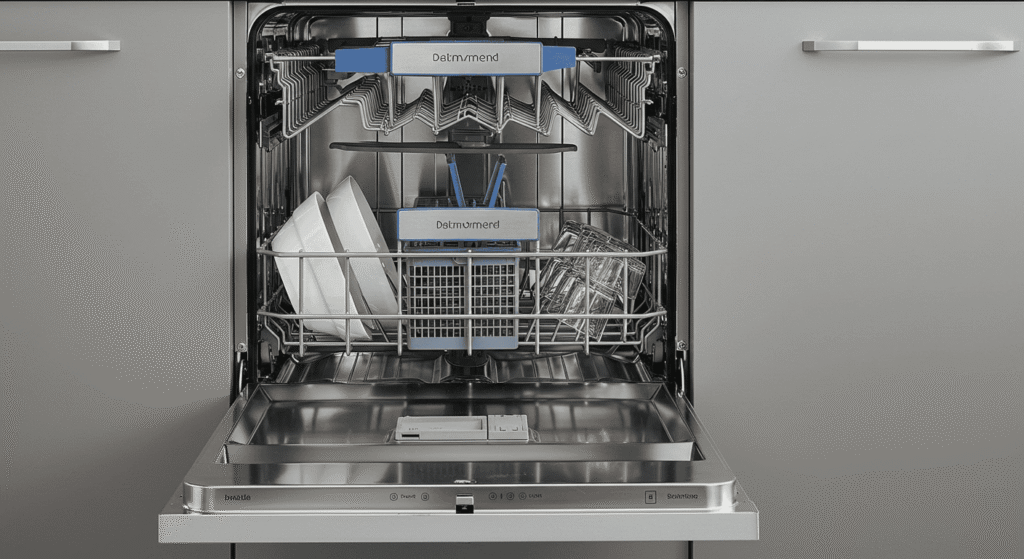
Using common household ingredients like vinegar and baking soda is a simple, natural, and effective way to clean your dishwasher and eliminate unpleasant odors. These ingredients work together to break down buildup, disinfect surfaces, and leave your appliance smelling fresh—all without harsh chemicals.
Why These Household Ingredients Work So Well
White vinegar is acidic, which helps dissolve mineral deposits, soap scum, and grease inside your dishwasher. It also has natural antibacterial properties that kill odor-causing bacteria. Baking soda acts as a gentle abrasive and deodorizer, lifting grime and neutralizing bad smells. Together, they form a powerful yet safe cleaning duo that refreshes your dishwasher without risking damage.
The Perfect Cleaning Cycle: When and How to Run It
To clean your dishwasher using vinegar and baking soda, start by placing a cup of white vinegar in a dishwasher-safe container on the top rack. Run a hot water cycle without detergent to allow the vinegar to wash over the interior. After this cycle finishes, sprinkle about a cup of baking soda across the bottom of the dishwasher. Run a short, hot water cycle to let the baking soda scrub and deodorize the inside. For best results, perform this cleaning once a month or whenever you notice odors or buildup.
Dos and Don’ts for Safe and Effective Use
To get the most out of vinegar and baking soda cleaning without causing harm, follow these simple guidelines:
- Do use white vinegar diluted with water if you want to clean seals or exterior parts.
- Do run the dishwasher empty during cleaning cycles with vinegar and baking soda.
- Don’t mix vinegar and baking soda directly together before placing them in the dishwasher; their reaction happens best during separate cycles.
- Don’t use bleach or other harsh chemicals in combination with vinegar, as this can create harmful fumes.
- Don’t overuse vinegar, as excessive acid may damage rubber components over time.
| Ingredient | Uses | Benefits | Precautions |
|---|---|---|---|
| White Vinegar | Dissolves mineral deposits, disinfects | Removes odors, cleans grime | Avoid excessive use on rubber seals |
| Baking Soda | Gentle scrubbing, deodorizing | Neutralizes odors, lifts stains | Don’t mix directly with vinegar before use |
Dealing With Stubborn Odors and Mold — Advanced Tips
Sometimes, regular cleaning isn’t enough to fully eliminate persistent odors or mold buildup inside your dishwasher. Tackling these tougher problems requires a more targeted approach and sometimes alternative natural solutions. Understanding how to identify and treat these issues early can save your dishwasher from long-term damage.
Identifying Mold Spots and How to Treat Them
Mold in your dishwasher usually appears as black or greenish spots, often found around the rubber gasket, door seals, or corners where water tends to collect. If you spot mold, it’s important to act quickly. Use a cloth soaked in white vinegar or hydrogen peroxide to scrub the affected areas thoroughly. For stubborn spots, allow the solution to sit for 10-15 minutes before wiping it away. Regular inspection and cleaning of these areas prevent mold from spreading and causing unpleasant odors.
Using Alternative Natural Cleaners for Tough Smells
When odors persist despite vinegar and baking soda treatments, natural alternatives like lemon juice or activated charcoal can help. Lemon juice’s natural acidity breaks down grime and leaves a fresh scent, while activated charcoal absorbs odors effectively. Placing a small bowl of activated charcoal inside the dishwasher overnight can help neutralize lingering smells. Always rinse the dishwasher with a hot water cycle after using these alternatives to avoid residue buildup.
When to Call It Quits: Signs You Need Professional Help
If you’ve tried all natural cleaning methods and your dishwasher still smells bad or shows signs of mold growth, it might be time to consult a professional. Persistent drainage problems, visible corrosion, or mold deep inside the machine’s components indicate issues that require expert attention. Early professional intervention can prevent costly repairs and extend your dishwasher’s lifespan.
Maintenance Hacks to Keep Your Dishwasher Fresh Longer
Keeping your dishwasher clean is not just a one-time task—it requires consistent care to maintain peak performance and freshness. By following simple maintenance hacks, you can prevent buildup, eliminate odors before they start, and extend the life of your appliance with minimal effort.
How Often Should You Clean Your Dishwasher? A Practical Schedule
Establishing a cleaning routine helps keep your dishwasher running smoothly. As a general rule, deep clean your dishwasher once a month using natural ingredients like vinegar and baking soda. However, some parts, like the filter, should be checked and cleaned more frequently—ideally every two weeks—to prevent clogging. Paying attention to signs like odors or residue can help you adjust this schedule based on your usage and water hardness.
Quick Weekly and Monthly Tips to Avoid Buildup
In between deep cleans, perform quick maintenance tasks to reduce grime buildup. Weekly, wipe down the door seals and check the drain for food debris. Monthly, run an empty cycle with vinegar or use natural rinse aids to keep the interior fresh. Regularly removing leftover food scraps from dishes before loading also reduces strain on your dishwasher and keeps filters cleaner longer.
Eco-Friendly Rinse Aids and Other Smart Practices
Using eco-friendly rinse aids made from natural ingredients helps improve drying and prevents water spots without adding harsh chemicals to your dishwasher. Additionally, avoid overloading your dishwasher to ensure thorough cleaning and better water circulation. Keeping the dishwasher door slightly ajar between uses helps air circulation and reduces moisture buildup that causes odors.
Troubleshooting Common Dishwasher Cleaning Problems
Even with regular cleaning, sometimes your dishwasher may still face issues that affect its performance and freshness. Knowing how to troubleshoot these common problems can save you time and keep your appliance running smoothly.
Dishwasher Still Smells Bad? What You Might Be Missing
If unpleasant odors persist despite cleaning, you might have missed hidden areas like the drain hose, door seals, or the detergent dispenser. Food debris trapped in these spots can cause lingering smells. Try cleaning these parts with a vinegar-soaked cloth or a soft brush. Also, check if the filter is thoroughly cleaned and dried after each cycle to prevent mold growth.
Spray Arms Not Rotating Properly — Quick Fixes
When spray arms don’t spin freely, dishes may not get cleaned properly. This often happens due to clogged holes or debris stuck in the arm’s bearings. Remove the spray arms and clear out any blockages with a toothpick or thin brush. Make sure they’re securely reattached and can rotate without resistance before running the dishwasher again.
What to Do If Your Dishwasher Isn’t Draining Fully
Poor drainage can cause standing water and bad odors. Common causes include clogged filters, blocked drain hoses, or a malfunctioning drain pump. Begin by cleaning the filter and checking the drain hose for kinks or debris. If water still doesn’t drain, it may be necessary to inspect or replace the drain pump—consider calling a professional if you’re unsure.
Troubleshooting Common Dishwasher Cleaning Problems
Even with regular maintenance, your dishwasher might still experience issues affecting its cleaning performance and freshness. Here are some common problems and quick solutions to keep your dishwasher running smoothly.
Dishwasher Still Smells Bad? What You Might Be Missing
Q: Why does my dishwasher still smell bad after cleaning?
A: Lingering odors often come from hidden spots like the drain hose, door seals, or detergent dispenser where food debris accumulates. Make sure to clean these areas thoroughly with a vinegar-soaked cloth or soft brush. Don’t forget to clean and dry the filter after each cycle to prevent mold growth.
Spray Arms Not Rotating Properly — Quick Fixes
Q: What causes spray arms to stop rotating?
A: Spray arms can get clogged with food particles blocking the holes or the bearings can become stuck. Remove the spray arms and use a toothpick or thin brush to clear any debris. Reattach the arms securely and check they spin freely before running the dishwasher.
What to Do If Your Dishwasher Isn’t Draining Fully
Q: Why isn’t my dishwasher draining water properly?
A: Common causes include clogged filters, blocked drain hoses, or a faulty drain pump. Start by cleaning the filter and inspecting the drain hose for kinks or obstructions. If the problem persists, the drain pump may need repair or replacement. Consider professional help if you’re uncertain.
Fun Facts and Myths About Dishwasher Cleaning You Should Know
Understanding the truths and myths about dishwasher cleaning can help you maintain your appliance better and avoid common mistakes. Plus, knowing some surprising benefits might motivate you to keep up with regular maintenance. Let’s dive into some fun and useful facts that every dishwasher owner should know!
Debunking Common Misconceptions
There are plenty of myths floating around about how to clean dishwashers effectively. For example, many believe that dishwasher detergents alone keep the machine clean — but residues and buildup still occur over time. Another myth is that harsh chemicals are necessary for cleaning; in reality, natural ingredients like vinegar and baking soda can do the job just as well, without damaging your appliance. Understanding what really works can save you money and protect your dishwasher’s longevity.
Surprising Benefits of Regular Dishwasher Cleaning
Regularly cleaning your dishwasher doesn’t just eliminate odors—it improves washing efficiency, reduces energy and water waste, and extends the life of your machine. A clean dishwasher also means your dishes come out spotless and hygienic every time. Plus, maintaining your appliance reduces the risk of costly repairs, making it a smart and easy investment.
Quick Quiz: Test Your Dishwasher Cleaning Knowledge!
How much do you really know about keeping your dishwasher in top shape? Take this quick quiz to find out!
- True or False: You should run a vinegar cleaning cycle with dishes inside.
- What is the safest natural ingredient for deodorizing your dishwasher?
- How often should you clean the dishwasher filter?
- Name one area besides the filter that commonly harbors mold.
Try answering these questions and see how much you’ve learned!
How to Clean Your Dishwasher for Lasting Freshness and Performance
Knowing how to clean your dishwasher properly is key to keeping your appliance running efficiently and your dishes sparkling clean. Regular maintenance not only prevents odors and buildup but also extends the lifespan of your dishwasher, saving you time and money in the long run. By using natural ingredients, following practical cleaning steps, and staying consistent with care, you can enjoy a fresh, hygienic dishwasher that works at its best every day. Start incorporating these tips today and make dishwasher cleaning an easy part of your home routine!









